By Shannon Jones
14 March 2011
(Photos and story from Red Quixote website, courtesy of the Coalition Against Utility Shut-offs and http://wsws.org.)
On March 12, the Committee Against Utility Shutoffs (CAUS) held a spirited demonstration down Dexter Avenue in Detroit to demand an end to utility shutoffs.
About 100 people participated in the event, representing a wide cross-section of workers and young people. Demonstrators included neighborhood residents, teachers, health care workers, unemployed and retirees. There were also Detroit high school students, community college students and students from Eastern Michigan University, Wayne State University, Oakland University and the University of Michigan.
Watch video at http://redquixote.wordpress.com/2011/03/17/video-the-committee-against-utility-shutoffs-holds-demonstration-in-detroit/.
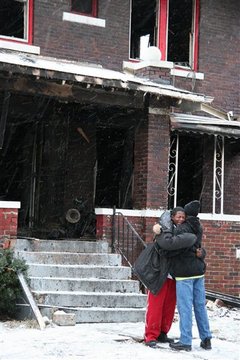
Antonio Allen, 18, left, is comforted by his older brother, Marvin Allen Jr., upon seeing the remains of the family home in which their father, Marvin Allen Sr., 61; uncle, Tyrone Allen, 60; and Lynn Greer, a female friend of his uncle, died in a fire Jan. 5, 2010.
The march began at the scene of a tragic fire that took the lives of three people on January 5, 2010: two disabled brothers, Marvin Allen, 62, and Tyrone Allen, 61, and Lynn Greer, 58. The fire was sparked by a space heater being used to heat the home after utilities had been shut off.
CAUS chairman and SEP Assistant National Secretary Lawrence Porter spoke from the steps of the Allen house, which still remains as it was after being consumed by flames over one year ago. He began by calling for a moment of silence in the memory of the Allen brothers and all those who have died due to utility shutoffs.
In opening his remarks Porter said that the demonstrators “pledge to remember those who have lost their lives in fires caused by utility shutoffs. At the same time we raise our voice in protest against the barbaric conditions that led to their tragic deaths.” (See, “Lawrence Porter at CAUS rally: ‘Utilities are a social right!’”.)
“Utilities are a social right,” Porter insisted, to acclamations from those assembled. “People have a right not to freeze to death! They have the right not to live on the bare edge of survival. To realize this right, however, we must fight for it. And this demonstration is an initial stage in this fight.”
Porter said that CAUS was formed and the demonstration called on the basis of the understanding that “if workers are to win their rights, they must organize themselves independently”—independently of the trade unions and the Democratic Party. In particular, he pointed to the role of Michigan Governor Jennifer Granholm and Detroit Mayor David Bing in supporting the interests of DTE and other utility companies. (VOD ed: Read VOD article “Utility privatizer running Water Department at http://voiceofdetroit.net/?p=4865.)
“We are here not to appeal to DTE, for they do not hear our appeals,” Porter concluded. “We are here not to beg Mayor Bing, for he listens to a different paymaster. We are here to assert our strength, the strength of the working class. We are here to pledge to carry forward this struggle until we have created a society that no longer sacrifices the lives of those who have died here, along with countless millions throughout the world, to the altar of profit.”
The demonstrators marched north on Dexter Avenue carrying signs and banners. Chants of “Heat and light are social rights,” “Utilities for profit—we’ve got to stop it” and “Money for schools, not for war,” attracted interest and support from neighborhood residents, motorists and shoppers.
The march was followed by a meeting at the Dexter-Elmhurst community center. After introductory remarks by Porter, who described the enormous extent of the utility shutoff crisis in Detroit and nationally, members of CAUS and others participating in the demonstration spoke about their own experiences with utility shutoffs and the purpose of the march.
Doris, a member of CAUS, said, “This is about making a change. We have to understand that we can do it if we come together united and stand for the same cause. It is for the people all over the world.
“Lights and utilities should be affordable for everyone…We must stand together and let people know that we are no longer going to be oppressed by corporations, by DTE, by the government. We have to stand up for what we believe in. Utilities are a social right,” Griffin declared.
“It is inhuman to have utilities cut off in the winter—it is causing death,” Griffin added. “A month ago a friend of mine died. She was cold from September all the way through January. When they finally turned the utilities on she just lay down and died the next week. She was 60 years old.
“I met a woman who paid $696 for her utility bill. She told me ‘I chose between my utilities or my mortgage.’ She said ‘I can’t let my baby be cold, so I took my mortgage payment and paid my utilities, and now I have to find a way to make up my mortgage.’
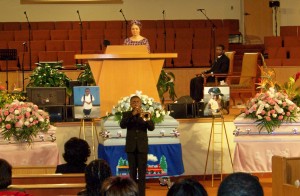
Tro'vion Young's classmate plays "Amazing Grace" at funeral for Tro'vion, Serena, and Fantasia Young, toddlers who died in fire after DTE shut-off last year.
“While these things are happening people are out of jobs, they are losing their homes… Who can afford to pay five, six, seven, eight hundred dollars a month for utilities? You pay one month, and you are looking at another $600 or $700 payment the next. What we have done today is show the world that we are going to stand for the rights of people.”
Another CAUS member, Cynthia, said, “It is a shame what DTE is doing to the people. I know a guy who owns a Coney Island [diner]. They charged him $3,000. They are getting ready to turn his gas off. I brought him a poster for the march. He was so glad to have it.
“We are in the right…It is a shame people’s bills are so high. It is a shame when you get your bill out of the mailbox, and it is so high even though you are not using gas and lights.”
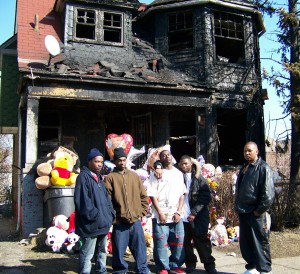
Fire rescuers Dante Wilson (l) and Jarmar Taylor (center) grieve with other neighborhood youth at site of fire that killed the Young children after DTE shut-off.
Kimberly spoke about the paltry help available to those who have fallen behind on their bills. “I have dragged my sister to three of the sessions DTE gives at these churches. They tell you the same thing about weatherizing your houses. They give you a certificate and a few plastic things to put on your windows. I have not received any help from DTE yet.
“I went to the DTE customer assistance day, and I still haven’t received anything they promised me.”
An unemployed worker from Detroit spoke on the connection between utility shutoffs and the lack of jobs in the city. “People have the right to work, the right to live,” he insisted. “It is time to take a stand, to take control. We should not ask them to do things, we should demand.”
A Detroit high school student spoke of the problems his family was facing as a result of shutoffs. “It is a shame what they do to our household.” He said that his father was in prison, so his mother told him he had to stand up and help take care of the family. “How can I stand up when DTE cuts off our heat? When you pay them all you can give, why are they still cutting your gas and lights off?”
“Something is wrong. It is time to put our foot down. I say we are not taking this. Step up for your rights.”
Linda, a worker at an Oakland County non-profit agency, related her experiences. “I have calls from people who had their utilities shut off. I had a mother who had to give her infant to a relative because she had no heat in her home.
“This is not just in Detroit. We need to make people aware of what is going on. It is important to spread the word and let people know we are suffering.”
Toward the conclusion of the meeting, SEP National Secretary Joseph Kishore noted that everyone in the room spoke for thousands of people who are facing similar outrageous conditions—bills in the hundreds or even thousands of dollars, heat cut off in the dead of winter, lawns dug up to prevent any possible access to gas.
“The ruling class is at war with the population,” Kishore said, “and workers are beginning to fight back.” He referred to the events in Wisconsin, where 100,000 workers were demonstrating the same day against the attack on their democratic rights and benefits, as well as the social eruptions in Egypt and the Middle East.
Kishore spoke about the role of both Democrats and Republicans in attacking the working class, citing the way in which Democratic governors and the Obama administration were slashing social programs. Obama has proposed to cut in half federal funding for heating assistance, already completely inadequate to meet social need.
The fight of workers for their rights and interests brought them into conflict with the corporations and the capitalist system as a whole. “The right to heat and gas is opposed to the right of utility companies to shut off utilities. The right to employment is opposed to the right of the corporations to destroy jobs. The right to education is opposed to the right of the government to shut down our schools.
“If we accept capitalism, then we accept the right of these companies to profit off the backs of the working class.”
The Socialist Equality Party initiated the Committee Against Utility Shutoffs in anticipation of emerging struggles of the working class. Workers need their own organizations, Kishore said. “Above all, the working class needs its own political party and leadership.”
In closing, Kishore urged those in attendance to join the SEP and make plans to attend the conference, The Fight for Socialism Today, sponsored by the Socialist Equality Party and the International Students for Social Equality to be held in Ann Arbor on the weekend of April 9-10.
http://redquixote.wordpress.com/2011/03/14/demonstration-in-detroit-demands-end-to-utility-shutoffs

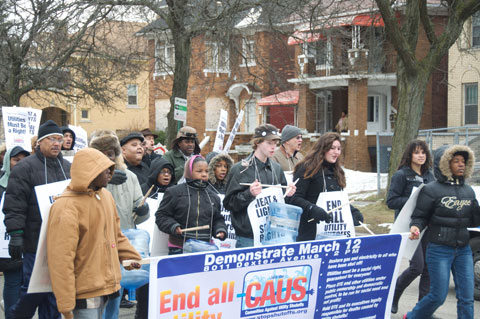
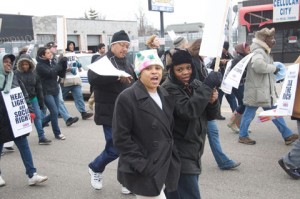
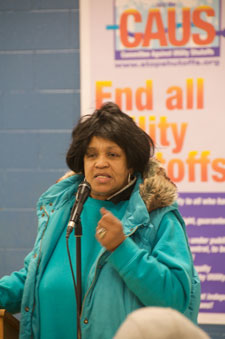
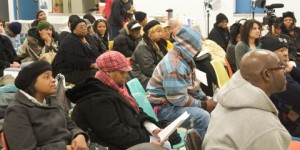




p.s. there are 2 “f’s” in “shut-offs”.
There’s already a THAW fund to pay the bills of those who don’t/can’t. There are welfare payments to cover utility bills, there’s a law against shutting off heat in the winter. All of these programs are paid for by donations or by the taxpayer. Now they DEMAND that utilities allow electricity, gas and water to continue to be consumed and stick ME with the bill.
Where will someone elses idea of compassion stop dipping into my wallet?
Thge government (or more accuratley, the taxpayer) is not responsible to keep everyone from every problem they may come across.
We already pay for school meal programs (at least 2 meals a day) and summer meal programs for people collecting welfare/food stamps and who-knows-what other programs. Don’t call me heartless call me sick of others thinking they have a right to MY money. There was a time when people didn’t make DEMANDS like this. They went to their family, to their church or to charities.